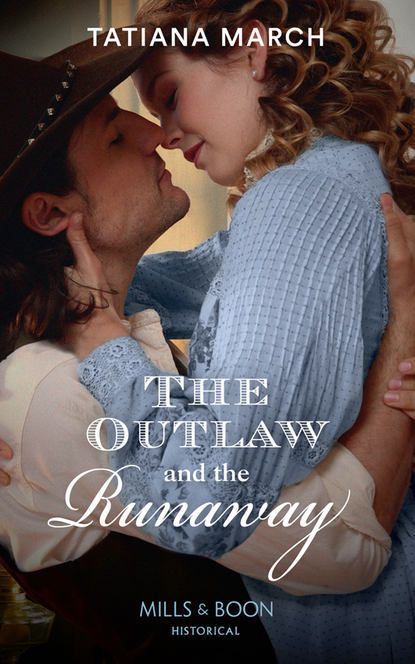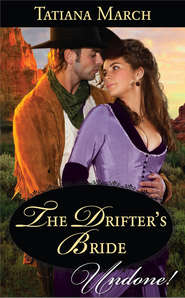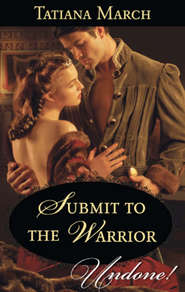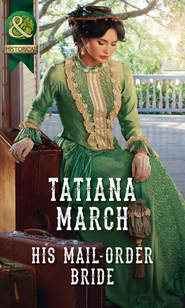По всем вопросам обращайтесь на: info@litportal.ru
(©) 2003-2024.
✖
The Outlaw And The Runaway
Настройки чтения
Размер шрифта
Высота строк
Поля
Sitting cross-legged in front of the stone chimney, Roy pulled a knife from the scabbard in his boot and sliced away his shirt. Easier than trying to lift his arms overhead to undress. The coarse white cotton was matted with blood but the bleeding had slowed to a trickle.
Gently, Roy felt the wound in his shoulder with his fingertips. There was no exit hole, but high up on the front he could feel a small lump beneath the skin. The surge of relief nearly made him faint. From the way he’d been able to move his arm, he’d known the bone remained intact, but had the bullet lodged deeper inside his shoulder, it might have been impossible for him to remove.
Leaning toward the fire, Roy enjoyed the comfort of heat while he held the tip of his knife to the flames to purify it. When he was satisfied the blade was clean, he made a small incision at the front of his shoulder, in the fleshy part where the muscle sloped toward the neck, to create an exit wound. With pressure from his fingertips, the bullet slid out.
It was a .36 caliber homemade lead ball. Despite the small size, had the bullet struck lower, it would have shattered the bone, most likely leaving too many fragments to remove. And even if Roy hadn’t already known, the small lead ball would have revealed the shooter to be Lom Curtis. Short and slight, the leader of the outlaw gang liked his pair of lightweight Navy Colts and had never switched to more powerful weapons or jacketed ammunition.
Roy tossed the bullet into the fire and inspected the remains of his shirt, assembling the back panel like a jigsaw puzzle. A small circular piece was missing. He swore. During his years on the outlaw trail, he’d seen plenty of doctoring for gunshot wounds, both by qualified surgeons and by anyone with a knife and a steady hand, and he understood that a piece of fabric left inside the wound could kill as effectively as a vial of poison.
Behind him, Dagur was snoring, asleep on his feet. Roy twisted around and raised his voice. “Dagur, sit down.”
The horse blinked his eyes open, gave a protesting whinny but folded his legs and sank to the earth floor. Roy reached over and tugged his saddlebags free. Summoning all his strength, he loosened the cinch on the saddle girth and pulled the weight off the horse, letting the saddle tumble to the ground.
“It’s okay, boy,” Roy said. “Go to sleep.” With another whinny, Dagur rolled over to his side and extended his legs, filling half the cabin, and resumed his snoring.
Roy tore a section from the clean part of his shirt and spread the piece of fabric on the earth floor. From his saddlebags, he took out a piece of rawhide string, a flask of whiskey and a bottle of kerosene, and a needle. Moving stiffly, fighting the pain, he arranged the objects on the cloth. Last, he snatched the black wig from his head, used his knife to snap away a couple of the horsehairs and dropped them into the iron cauldron on the fire to boil.
Using the rest of his shirt for rags, it only took him a minute to wash away the dried blood. When he was finished, Roy soaked the rawhide string in the bottle of kerosene, took a gulp of whiskey and then he pushed the string into the exit wound he had made, feeding the rawhide through his shoulder with his fingers until he could reach over to his back and pull the cord through. Stoically, he closed his mind to the fiery pain and lifted the rawhide string to inspect it in the light of the fire crackling in the hearth.
No scrap of cotton clung to the cord.
Fighting a dizzy spell, Roy soaked the rawhide string in kerosene again, tied a knot to one end and repeated the process. On the fourth pass, a piece of fabric clung to the knot. His body shaking with exhaustion, his movements clumsy, Roy lined the scrap of cotton with the hole in the back panel of his shirt. It fit. Relief cut through the haze of pain that dulled his brain. He’d gotten all the cotton fibers out. He had a good chance now.
Three more times, Roy dragged the kerosene-soaked string through the wound, sipping whiskey in between to revive himself. When a man had someone else to do the doctoring, he could escape the pain into unconsciousness. A man alone had no such luxury.
Satisfied the wound was clean, Roy compared how much kerosene and whiskey he had left. About the same, a couple of inches. But there was no lamp, so he kept the whiskey for drinking and poured the kerosene over the wound, front and back.
Once more, he held the blade of his knife to the fire, keeping the steel in the flames until it glowed white-hot. Gritting his teeth, he pressed the tip of the blade to the exit wound to cauterize the skin and did the same to the entry wound, awkwardly reaching around to the back of his shoulder. Finally, he fished the horsehairs out of the boiling water. After checking they had softened enough, he cleaned the needle with a drop of whiskey, threaded it with a strand of horsehair and closed the holes in his flesh with a few crude sutures.
He longed for a cup of coffee, but his strength gave out. Barely able to muster up enough energy to rummage in his saddlebags, he took out his tin cup, scooped it full of boiling water, tossed in a few lumps of sugar, added a dollop of whiskey and drank the mixture as soon as it had cooled enough not to scald. Then he yanked his bedroll free from the straps behind the saddle, rolled into the single remaining blanket, laid his head down and let unconsciousness slide over him.
* * *
When darkness fell over the surrounding hills and filtered in through the closed shutters, Roy roused himself long enough to strip the bridle from Dagur and shove the door open. The horse wouldn’t stray far from the spring.
The fever came on the second day, drenching Roy in sweat and sending icy shivers through his battered frame. Days and nights blurred together in the shadowed interior of the dugout cabin. He ate nothing but drank plenty of water, boiling it first, in case it had gone stale inside the oak barrel. At all times, he kept his pair of loaded guns within an easy reach.
In dime novels, when an injured outlaw came to, there would be a pretty girl standing by his bedside, smiling down at him and patting his brow with a cool cloth. There was no girl with a cool cloth for him, and no soft bed, only the hard earth floor, but when Roy’s mind grew hazy, he imagined Celia Courtwood leaning over him, her gold-streaked curls tumbling down to his naked chest, a smile brightening her features. Then reality would intrude, and he realized it was only a dream—could never be anything but a dream.
* * *
Celia squatted on her heels by the oak counter of the bank, rubbing furniture polish into the ugly scratches the outlaws had made with the rowels of their spurs. She’d already scrubbed every inch of the floor, as if the violence had left behind a layer of filth she must remove. On the polished timber planks, a few drops of blood had painted a trail toward the exit.
His blood. The man who had protected her father. Before scrubbing away the dark stains, Celia had pressed her fingertips to them, relishing that small connection to the stranger whose memory filled her with a flurry of mixed emotions—from gratitude to disapproval, from resentment to fascination, and beneath all those other emotions a strange longing that felt almost like a physical ache in her chest.
With increased vigor, as if to banish the handsome outlaw from her thoughts, Celia smeared more polish into the wood. For two days now, she had worked—unpaid—helping her father and Mr. Northfield to restore order in the bank. In truth, her father wasn’t contributing much. Mostly, he was sitting down, gasping for breath, his hands clasped together in front of him, palms pressed to his belly.
Every now and then Celia noticed the bank manager casting a hostile glance in her father’s direction. She suspected Mr. Northfield was ready to overcome his scruples about dismissing a sick man, which would leave them to survive on whatever little she could earn in her part-time position at the mercantile.
Refusing to give in to despair, Celia straightened on her feet. She dropped the turpentine-soaked rag into the steel bucket on the floor, wiped her hands on a piece of clean linen cloth and raised her voice to carry across the cracked glass partition.
“That’s the best I can get it.”
Before Mr. Northfield had a chance to come around and pass judgment on her efforts, footsteps thudded by the entrance. All day, curious visitors had crowded into the bank. Celia moved aside. It was up to the manager to deal with anxious inquiries from customers who might be worried about the safety of their deposits.
The man who strode in was thin and wiry, with a walrus mustache and a piercing blue gaze beneath an expensive tan-colored Stetson hat. Celia noted the pistol at his hip, then homed in on the tin star pinned to the man’s rawhide vest. He must be the county sheriff from Prescott, fetched by one of the saloon keeper’s sons.
Mr. Northfield ushered Celia away with a flap of his hand. “You can leave now, Miss Courtwood.” The dismissive gesture conveyed no gratitude for her unpaid labor.
“Perhaps my father could leave, too?” Celia suggested, her brows lifted in a tentative appeal. “He is still very shaken up after the ordeal and could do with a rest.”
“No,” the manager replied, his tone sharper than the request warranted.
“It’s all right, Celia girl,” her father cut in. “I am needed here. I shall have to make a statement, tell the sheriff what happened.”
Celia glanced from her father to the bank manager. There was something going on between those two, some undertone of hostility she failed to comprehend. Since the robbery, Mr. Northfield had been looking at her father with a dislike that bordered on disgust, even though the two of them had always been on cordial terms before.
“All right.” Celia attempted a bright tone. “I’ll get supper started. I’ll expect you home shortly, Papa.” She nodded to the men and walked out past the wiry sheriff. At the hitching rail outside, a bay gelding stood basking in the afternoon sun. Iron shackles and a coil of sturdy rope hung from the saddle, in readiness for a prisoner.
Tools of a man’s trade, Celia recalled thinking two weeks ago when she’d caught a glimpse of the pair of guns the outlaw with mismatched eyes wore beneath his long duster. And just like on that other occasion, a shiver of apprehension rippled over her.
Her hand crept up to her chest, to touch the small silk pouch where she wore the stranger’s gold coin on a string around her neck, like a keepsake to make sure they would meet again. But why dream of such an encounter, when an outlaw was like a hunted animal and any romantic interest in such a man could only bring a woman grief?
* * *
Footsteps thundered across the porch. Even before she hurried to the door, Celia knew it could not be her father, for a tired shuffle would announce his arrival. It was the barber, Mr. Grosser, a tall, rawboned man whose body always seemed to be listing to one side.
“Come quick, Miss Celia,” he said, even in his haste polite enough to snatch his hat down from his head. “I have your father at the back of my shop.”
Startled, she stared at the gangly barber. At the back of my shop. Rock Springs had no jail, and no marshal since Todd Lindstrom had been gunned down by rustlers a year ago. When someone needed to be detained, he was locked up in the small, windowless storeroom at the back of the barbershop, and kept there until he sobered up or, in the case of more serious crimes, until the county sheriff from Prescott arrived to fetch him.
“But why?” Celia implored. “Why?”
“Well, Miss Celia...” The barber turned his hat over in his hands. “They say he was in on the robbery. That he tipped off the gang of outlaws about all that gold in the bank and advised them how to go about stealing it.”
“W...what...?” After she’d overcome her startled reaction, indignation flared within Celia, like a flame licking at her insides. Her poor, sick father, to be bothered with such crazy accusations. “That is nonsense. Complete, utter nonsense.” She squared her shoulders, bracing for a confrontation. “Where is the sheriff?”
“He’s in the saloon, having his supper. When he’s finished, he’ll take your father to Prescott for a trial. It is a full moon tonight, light enough to travel after sunset.” Mr. Grosser replaced his hat on his head and turned to go. “Miss Celia, you’ll need to come quick if you want to see your father. I’m here against the sheriff’s orders. He does not want you to talk to your father, in case he might use you to pass a message to his accomplices.”
“Use me?” Her voice grew shrill at the incongruity of it. “To pass a message? To his accomplices?” Never had she heard such utter balderdash. Could this be some kind of a practical joke at her expense? Yes, that’s what it had to be. She’d play along, act her part as the hapless victim of the warped sense of humor of the citizens of Rock Springs.
Celia snatched her bonnet from a peg by the door, flung it over her upsweep and marched out, tying the laces beneath the chin as she tried to keep up with the barber’s long strides. On the normally quiet Main Street, a dozen people were loitering about in artificially casual poses, men flicking dust from their coat lapels, women pretending to be inspecting the displays in the store windows, while their true purpose was to steal covert glances at her.
Not looking left or right, Celia clattered up the steps to the boardwalk in her leather half boots. For an instant, she was forced to stand still while the barber bent his head to unlock his premises. The force of all those curious stares bombarded her in the back, like a flurry of Indian arrows landing between her shoulder blades.
Finally, the lock clicked open and the barber held the door wide while Celia stepped through. The pungent smells of cologne and shaving soap filled her nostrils. She’d never been to Mr. Grosser’s premises before. In normal circumstances, she would have enjoyed the opportunity to inspect such a bastion of masculine grooming, but today she paid scant attention to her surroundings.
The barber ushered her past the big leather chair to the rear of the shop and slid open the crudely made hatch in a thick, iron-studded oak door. Equipped with heavy steel hinges and twin bolts, the storeroom had been specifically reinforced to act as a place of detention.











